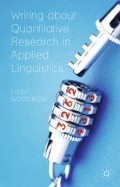Abstract
This chapter is about writing about the procedure of the research. This includes a discussion of reliability, validity and the ethics of research and writing. The level of detail about these issues varies across texts, but the reliability and validity of the study must feature in the text. Some-times these issues are evident from the research instruments and analysis and sometimes they are referred to explicitly. This chapter includes the following sections:
-
Technical information
-
Reliability of a measure
-
Internal validity
-
External validity
-
Research ethics
-
-
Examples
-
Reporting on reliability
-
Writing about validity
-
Reporting on ethics
-
Writing about research procedure
-
Access this chapter
Tax calculation will be finalised at checkout
Purchases are for personal use only
Preview
Unable to display preview. Download preview PDF.
Further reading
Dörnyei, Z. (2007). Research methods in applied linguistics: Quantitative, qualitative and mixed methodologies. Oxford: Oxford University Press.
Paltridge, B. & Phakiti, A. (2010) (Eds.). Continuum companion to research methods in applied linguistics. London: Continuum.
Sources of examples
Lee, J.-A. (2009). Teachers’ sense of efficacy in teaching English, perceived English proficiency and attitudes toward English language: A case of Korean public elementary teachers. PhD, Ohio State University.
Levine, G. S. (2003). Student and instructor beliefs and attitudes about target language use, first language use and anxiety: Report of a questionnaire study. Modern Language Journal, 87(3), 343–364, doi: 10.1111/1540-4781.00194.
Lin, H., Chen, T., & Dwyer, F. (2006). Effects of static visuals and computer-generated animations in facilitating Immediate and delayed achievement in the EFL classroom. Foreign Language Annals, 39(2), doi: 203-219.10.1111/j.1944-9720.2006.tb02262.x.
Mills, N. (2011). Teaching assistants’ self-efficacy in teaching literature: Sources, personal assessments, and consequences. Modern Language Journal, 95(1), 61–80. doi: 10.1111/j.1540-4781.2010.01145.x.
Rai, M. K., Loschky, L. C., Harris, R. J., Peck, N. R., & Cook, L. G. (2011). Effects of stress and working memory capacity on foreign language readers’ inferential processing during comprehension. Language Learning, 61(1), 187–218. doi: 10.1111/j.1467-9922.2010.00592.x.
Rose, H. (2010). Kanji learning of Japanese language learners on a year-long study exchange at a Japanese university: An investigation of strategy use, motivation control and self regulation. PhD, University of Sydney.
Author information
Authors and Affiliations
Copyright information
© 2014 Lindy Woodrow
About this chapter
Cite this chapter
Woodrow, L. (2014). Reliability, Validity and Ethics. In: Writing about Quantitative Research in Applied Linguistics. Palgrave Macmillan, London. https://doi.org/10.1057/9780230369955_3
Download citation
DOI: https://doi.org/10.1057/9780230369955_3
Publisher Name: Palgrave Macmillan, London
Print ISBN: 978-0-230-36997-9
Online ISBN: 978-0-230-36995-5
eBook Packages: Palgrave Language & Linguistics CollectionEducation (R0)

